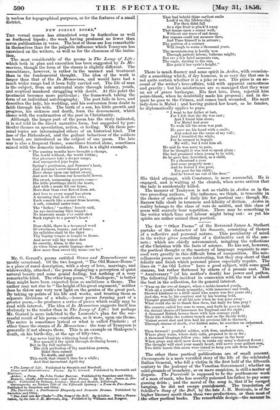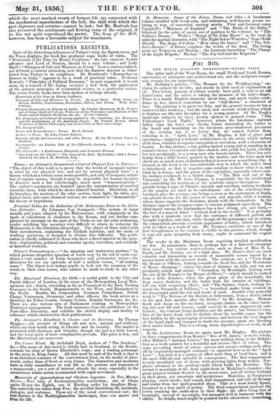NEW POETRY BOORS. ° Tux vernal season has stimulated song in
featherless as well as feathered bipeds ; the week having produced no fewer than seven publications in verse. The best of these are less remarkable in themselves than for the palpable influenoe which Tennyson has exercised on the writers, as well as for the closeness of the imita- tion.
The most considerable of the poems is The Lamp of Life ; which both in plan and execution has been suggested by In Me- moriam' though the form of the stanza is slightly different. The resemblance, however, is rather in the manner and treatment than in the fundamental thought. The idea of the work is larger than that of the ./n Memoriam and would have had a much wider range had it been fully carried out. The life of man is the subject, from an antenatal state through infancy, youth, and sceptical manhood struggling with doubt. At this point the treatment becomes more particular; the framework taking the form of an individual autobiography. The poet falls in love, and describes the lady, his wedding, and his conversion from doubt to faith through his wife. The birth of a son, his little growth and progress, his sickness and death, form the denouement, which closes with the confirmation of the poet in Christianity.
Although the larger part of the poem has the story indicated, it is not told in the direct narrative form, but suggested by par- ticular themes on speculation, action, or feeling. With these - Ronal topics are intermingled others of an historical kind. The loss of the Birkenhead, and the gallant behaviour of the soldiers cu board, are introduced as the subject of one poem. The late war is also a frequent theme, sometimes treated alone, sometimes mixed with the domestic incidents. Here is a slight example.
"The passing months have brought a change, The world without, the world within ; • Our pleasures take a deeper range,
And unexpected joys begin.
Spring's gentleness, and Summer's heat, And Autumn's ever-blessed power, Have shone upon our infant sweet, And now he blooms our household flower. His sweet, unmeaning accents come— His little prattlings thrill the heart, And with a music fill our home, More dear than ever flowed from art. And love to every sound has given A meaning that is all her own; Each cometh like a sound from heaven, A soft, celestial under-tone.
The 'father,' 'mother,' hourly said, An aye-increasing bliss impart : No heavenly music e'er could shed Such rapture to a parent's heart :
• • • Dear child, there is a treasured word Of sweetness, beauty, and of fame ; Its syllables shall be the third Thy lisping tongue is taught to frame. And never will thy waters flow So sweetly, Alma, to the sea,
As when those gentle lispings show
How more than sweet thy name can be."
Mr. G. Gerard's poems entitled Grace and Remembrance are mostly occasional. Of the two longest, "The Old Manor-House" is a piece of rural description, with a story of love, marriage, and widowership, attached ; the poem displaying a perception of quiet natural beauty and some genial feeling, but nothing of a very remarkable land. The other long poem, "To Shakspere," is better than might have been expected from so ambitious a theme. The author may not rise to "the height of his great argument," neither does he throw any very new light on the genius of the great poet. By taking up points of his life and works, and treating them as separate divisions of a whole,—lesser poems forming part of a greater poem,—he produces a series of pieces which really may be read with interest. The idea of In Memoriam suggests itself less obviously to the reader than in The Lamp of Life; but perhaps Mr. Gerard is more indebted to the Laureate's plan for the sue- _ssful result of his poem—variations, as it were, upon one theme. The metre is sometimes lyrical or what is called Pindaric ; at other times the stanza of In Memoriam the tone of Tennyson is generally if not always there. This is an example on Shakspere's death, on his birth-day, at the age of fifty-two.
"Age never laid his withering hand on thee, Nor quench'd thy spirit through declining hours ; But in thy full maturity, The rich perfection of thy matchless powers, Didst thou submit To death, and quit This earth that claim'd thee for a while; And that inconstant April day
• The Lamp of Life. Published by Simpkin and Marshall. Grace and Remembrance. Poems, By G. Gerard. Published by Bosworth and Harrison.
Arden : a Poem. By John Croker Barrow. Published by Saunders and Otley. &mods, elthyly Astronomical ; and other Poems. By the Bev. James .4. Sto- !hart. Published by Dolman, London ; Marsh and Beattie, Edinburgh. Carnaagnola, an Italian Tale of the Fifteenth Century: a Poem so FiveCantos. Published by Saunders and Otley. The Parricide : a Posthumous Rhapsody and Domestic Drama. Published by Saunders and Otley. "Des Lied nos tier Clooke"—The Sony of the Bell. By Schiller. With a Trans- lation, by the late J. H. Merit:rale, Rsik Published by Williams and Nollate•
That had beheld thine earliest smile Look'd on thy lifeless clay. For thou didst fall
Ass ripe fruit is pluck'd away That hangs upon a sunny wall,
Without one trace of sad decay. But seasons could not measure thee, And Time himself is in arrears ; Thy portion of a century Will laugh to scorn a thousand years.
The mountain-top is hardly won Through patient labour, toilsome might; But ere a few brief moments run,
The eagle, darting to the sun,
Has gain'd her eyrie's height."
There is much fluency and some spirit in Arden, with occasion-
ally a something which, if dry humour, is so very dry that one is not quite certain whether it is a joke or not. The piece is an ac- count of the writer's love-affairs, told with apparent earnestness and gravity ; but his misfortunes are so managed that they wear an air of grave burlesque. His first love, Dora rejected him point-blank, when he doubtfully made his proposal ; and in de-
spair he goes to the Crimea, and comes back wounded. His next lady-love is Mabel ; and having gained her heart, as he fancies,
he diplomatically applies to papa.
"1 went to her father at last, For I felt that the die was cast; And I found him alone, For Mabel had gone
To walk till the noon was past.
He gave me his hand with a smile, And asked me the cause of my 13;111; And I trembled the while,
For he seemed to beguile My will; but I told him all.
He said he was sorry to pain, But he thought it was best to speak plain: She had promised when young to be wild, So he gave her, betrothed, as a child, To a thousand a year And some property near ; And he feared I was poor,
Too poor for his child ;
And he bowed me out of the door."
His third. attempt, with Constance, is more successful. He is engaged, and is waiting at the church, when news arrives that the lady is accidentally 'killed. The manner of Tennyson is not so visible in Arden as in the two preceding authors. The influence, we think, is traceable in the choice of subjects of daily life for poetical use ; though Mr. Barrow falls short in terseness and felicity of diction. Arden in reality belongs to the class of vers de societe, and this class of poem will scarcely bear repetition. There may be something in the writer which time and labour might bring out: as yet his spirits are rather animal than poetical.
nets ; which are chiefly astronomical, of the Christian with the facts of science. He has not, however, the poelical thought or the mastery of language requisite to suc- ceed very greatly in this difficult form of composition. His mis- cellaneous poems are more interesting, but they stop short of that felicity and finish which personal pieces especially require. The lines on "An Old Letter" have a good subject, with some good stanzas, but rather flattened by others of a prosaic east. The " Anniversary " (of his mother's death) has power and pathos The following little incident in connexion with the war is lava the best in the collection, for its general interest.
" 'Twas on the eve of danger, when a noble-hearted youth, With all a youth's fresh sympathy, with innocence and truth
Showed kindness to a little maid who scarce was five years old;
And she, won by his courtesy and by his bearing bold, Thought gratefully of all his acts when he was gone away : What could she do to thank him then, but daily for him pray ?
His country called her sons to arms, and forth he goes to fight
On distant shores of Chersenese for England and for right ; A thousand British heroes there with lion courage yield Their life within the restless trench and on the bloody field; 'Grainst secret shot and iron hail his precious life is charmed, Through storms of death, o'er hidden mine, he marches on unharmed. • • * Then forward ! youthful soldier, with firm, unshaken eye, Where glory waits, where duty calls, prepared to do or die.; A thousand blessings follow you ; take courage in the hour When grape and shell mow down in ranks our army's choicest flower ; The thought will steel your manly heart, will nerve your gallant arm, Two little hands this morn were raised to keep you safe from harm."
The other three poetical publications are of small aeoonut. Carmagnola is a mere versffiel story of the life of the celebrated Italian General, who fell a victim in the first half of the fifteenth century to the jealousy of the Venetian Government ; whether an solid grounds of treachery, or on mere suspicion, is still a matter of dispute. The Parricide is supposed to be the posthumous work of a man of rank, who has secretly poisoned his father to pay some gaming debts ; and the moral of the song is, that if he escaped , he did. not escape punishment. The translation of hanging, Song of the Bell, by the late J. H. Merivale, is of far higher literary merit than these two productions, or than most of the other poetical books. The remarkable design—the manner in, The few "Other Poems" of the Reverend James A. Stothert partake of the character of his Sonnets, C011ftifiting of themes of a reflective and personal nature. This peculiarity of mind. in the writer gives something of a distinctive cast to the son-
• g the reflections
which the most marked events of human life are connected with the mechanical manufacture of the bell, the skill with which the poet digresses and returns—cannot be lost; but NET. Merivale has also preserved the sentiments and flowing verse of the original, if he has not quite reproduced the poetry. The Song of the Bell, however, has been a favourite subject for translators.



























 Previous page
Previous page